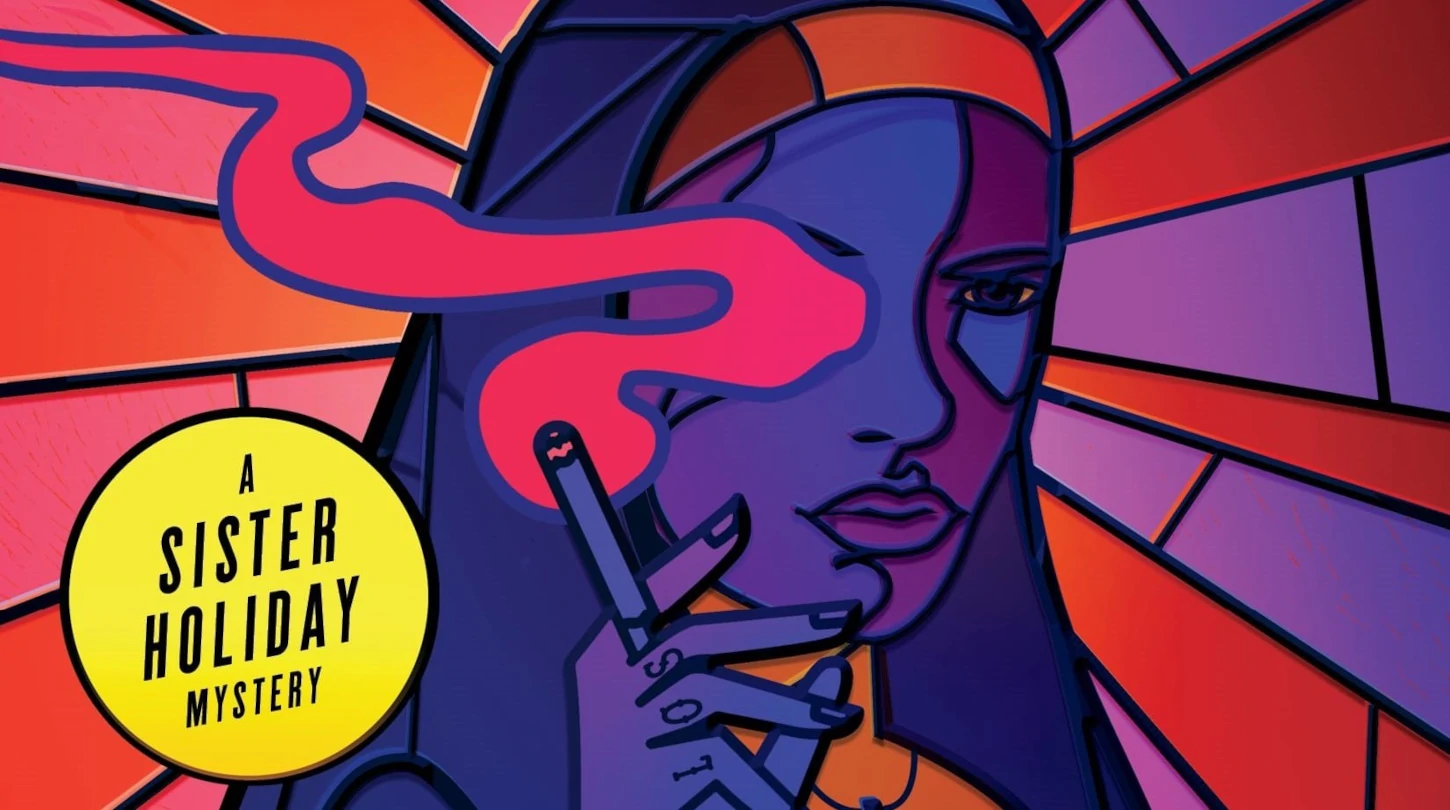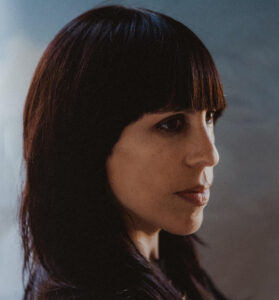
An Interview with Margot Douaihy
Words By Margot Douaihy, Interviewed by Inanna Carter
Your latest novel, Scorched Grace, is a crime fiction novel. What is it that draws you to this genre?
Hardboiled literature is obsessed with shadows, mirrors, and vice. Solving riddles and restoring order. Even for a brief moment, even for a client who doesn’t pay.
The hardboiled story begins with the acknowledgment that the world is broken, but it’s still worth the fight. Indeed, life is painful but can still be miraculous and achingly beautiful.
The hardboiled subgenre includes the lineage of wisecracking, hard-living, hard-drinking “lone wolf” PIs on the mean streets, pounding the pavement for cases. These sleuths are insider-outsiders, loners, rebels who test their mettle at high heats.
Hardboiled, like other subgenres, remixes elements from other categories, but tone, voice, and mood are key. Hardboiled stories are often gritty, unsentimental, or seductively subtextual, voice-driven narrative experiences. The sleuth is a piece of work—never afraid to throw a punch. But showing raw vulnerability is terrifying.
For all of these reasons and more, this subgenre has won my heart.
Landmark hardboiled authors include Black Mask Magazine writers. Think Raymond Chandler (elegiac, poetic), Dashiell Hammett (also a Pinkerton private eye), and Mickey Spillane. Then, the neo-hardboiled writers such as Sue Grafton, Walter Mosley, and Sara Paretsky, to name a few.
Styles and themes vary. Canonical PIs from the 1930s, 1940s, and 1950s have tons of misogyny, racism, homophobia, and xenophobia problems. Sometimes it’s hard to stomach. And yet, many foundational hard boilers also probed PTSD and post-war specters. In the lineage, writers like Katherine V. Forrest and Cheryl A. Head offer incisive critiques and stalwart LGBTQ characters. Most private eye characters work alone, but Spade paired with Archer. More codes than rules.
Some screen riffs on hardboiled include Jessica Jones and Veronica Mars. (There are so, so many.) The Big Sleep and The Maltese Falcon are classics. I am excited about decolonized, queer, trans, and nonbinary POVs in hardboiled lit. I am happy to see Scorched Grace situated in this wild legacy.
Speaking of inspiration, what gave you the idea to write Scorched Grace about “a chain-smoking, heavily tattooed, queer nun”? That’s quite the character! Were you inspired by someone specific? Did the idea just come to you?
I wanted to recast the hardboiled sleuth as a tatt’d up queer nun named Sister Holiday, a lone wolf by her own design. Her subversion is a reclamation of the hardboiled sleuth trope and my investment in queer futurity. Scorched Grace embodies dichotomies. dialectics, and the thrall of damage, ghosts, and queer resilience.

Continuing on the topic, you pride yourself as a queer artist who writes queer books that “shake the heteronormative.” There are a lot of us out there who need books like these. Were there any challenges in your publication journey, either in the beginning or even now, that you’ve faced with these queer stories?
When it comes to popular fiction, there are a bevy of market realities to consider. The investment in a new title (and a new author) is significant, and many publishers want to feel confident in their investment, and indeed, the return on investment. There is a balance between writing books for broad trade audiences—books that innovate, experiment, and test the elasticity of genre—while still delivering the experiences that genre readers crave. In other words, how do you write a truly inspired piece of art, a wildly weird book that takes a big creative swing, while ensuring it will sell well? For all these reasons (and so many more), I am fortunate to be published by the brilliant Gillian Flynn, who leads the imprint Gillian Flynn Books with Zando. Their mission is to publish books that are propulsive, culturally incisive, and conversation starting. It’s been a dream to land my weird series with this remarkable team. Gillian herself is a genius, so I’m very lucky to have her blessing and encouragement. It’s heartening to witness the gradual shift in the industry, but there’s always work to be done to ensure that diverse voices are not just heard but celebrated in the pop fic world.
As someone who also teaches, what would you say are some important lessons from a professor’s POV when it comes to writing?
The writing workshop is the art of self inquiry and an act of shared imagination. To intone Susan Sontag, writing is not necessarily about the world; it is its own world. Art is a world unto itself. This is a tenet that I hold dear to my heart. When I teach, I pose questions that I ask of my own art and process. Sharing ideas and experiences, informed by lived experiences, is one of the greatest gifts of being a writing teacher and working in the arts. I learn from my students every single day.
Your artist statement says: “…working across genres, I allow the identity of the project to locate its final form.” What does that kind of process look like for you?
I usually start a piece with a feeling. In the case of Scorched Grace, that feeling was heat. Total incineration. Raging fire. The passion of burning and burning of passion. I wanted to write a novel about the ways that fire can live inside the intellect as well as in the viscera—the corporeal and the cerebral in tandem. The liturgical layer and epistemologies complicate the mystery. With other pieces of art, the feeling may begin as a poem, but since form and content are crucially linked, I could start a draft with economy and concision, but the idea itself explodes out, demanding and insisting on a much longer form. Another example of this would be my poem, “The Book of Lace” in my collection Scranton Lace (Clemson University Press). It started as a meditation on the elegant danger of a needle, and the sculpture of a needle as utility, as well as aesthetic beauty of what the needle creates. Critical theory by Barthes and Bachelard about imagery and post-structural notions of text (meaning “to weave”) informed this work. The draft started as a tiny series of couplets, needle fine. Then the draft took on more POVs and it needed a richer home. The final draft is an eight-page poem that serves as a re-imagined origin story of lace. The book itself is an extended metaphor, yoking the derelict space of an abandoned lace factory to internalized homophobia. Two elaborate structures that once served a purpose but are no longer needed. And they are also hard to raze or dismantle completely.
Are there specific challenges you’ve faced writing crime fiction (specifically lesbian crime fiction) that may not be present in other genres you partake in?
I am interested in offering alternative narratives of power, agency, the illusion of good vs bad, and “justice.” The idea of justice is not axiomatic nor is it fixed. Justice looks very different depending on context and life experience. When I first started writing crime fiction, I encountered more “copaganda” types of storyline portrayals that romanticize and/or idealize law enforcement characters and PIs, and therefore perpetuate harmful stereotypes. Media and pop fiction can shape and influence societal perceptions, so this topic is extremely important to me. I am part of a movement to enrich and evolve our beloved genre of crime fic by incorporating intersectional perspectives, with a particular emphasis on featuring main characters from queer, BIPOC, and neurodiverse backgrounds.
As a professor do you often, if ever, find that working with students and their creative pieces and processes help you with your own? Has your process changed? If so, how?
Absolutely. Engaging with students and their creative journeys is a deeply enriching experience. Observing new perspectives and idiosyncratic approaches often offers fresh insights that let me reimagine craft and process. Teaching art and making art is a fundamentally reciprocal relationship. Pedagogy and individual creativity inform each other. Art in any form is a living, breathing thing. No one owns it. No one should be a gatekeeper. Education outfits writers with the support, rigorous contexts, craft consciousness, and skillful means to create compelling work, each person holds the magic inside.
You have another book coming out next year, Blessed Water. How do you balance life—teaching and everything that comes with that, hobbies, etc.—with writing your books?
A very detailed and disciplined daily list. Lists of lists. I try to keep each weekend free to play. To bike. To hike. To spend time with my family and cats. For about fifteen years, I worked for seven days a week. It began to erode my sense of self. We must stay attuned to our creative selves and inner child.
Are there any books coming out in 2024 that you’re really looking forward to, and why?
Humble nod to my own book, Blessed Water, which is a lyrical ripper that takes place over the course of three hellish days: Good Friday, Saturday, and Easter Sunday. It starts with Sister Holiday pulling the body of a dead priest out of the flooded river and takes off from there. I wanted to write a mystery that was both fast-paced and rich. Most chapters are about three pages. This is a mystery that readers can devour in real time during a weekend or in one sitting. Blessed Water is a queering of the traditional three-act structure. I’m also so excited about Ocean’s Godori by Elaine U. Cho. Becky Chambers meets Firefly in this big-hearted Korean space opera debut about a disgraced space pilot struggling to find her place while fighting to protect the people she loves.
Are there any books about writing that you recommend and swear by?
Craft in the Real World by Matthew Salesses, A Swim in the Pond in the Rain by George Saunders, and Meander, Spiral, Explode by Jane Allison.
If you could give one, general piece of advice to the aspiring authors out there, something that they should follow to the ends of the earth, what would it be?
Ack, just one! Writing is a process. Writing is rewriting. Reading is a form of writing. Reading (including via ears and audiobooks) enriches our storytelling abilities. Never ever ever give up. There is only ONE you in this world and your story deserves to be told.